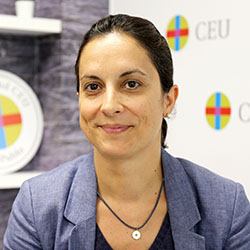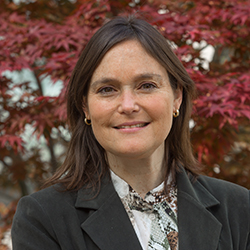One of the main arguments of the professors, who belong to universities such as CEU San Pablo, Navarra and Francisco de Vitoria, focuses on the deviation of the legal right to be protected, taking into account that the new draft organic law to be considered by the Cortes modifies the Organic Law of 2010 of the government of Rodríguez Zapatero.

"I remembered when Hannah Arendt, a philosopher of Jewish origin, spoke of the banality of evil in the wake of the Jewish extermination," explains Ana Sánchez-Sierra, professor at Institute of Humanities Angel Ayala of the CEU. "Evil has become so banal that we do not even think about what we are doing. In this law, compared with Zapatero's law of 2010, two very important technical issues disappear legally: the nasciturus, the unborn; and another, a concept that was in Zapatero's law, and is found in sentence 53/1985 of the Constitutional Court, which is conscious self-determination, which we professors of bioethics call autonomy, the principle of autonomy".
In Zapatero's law there are terms such as protection of prenatal life, fetal viability," continues Sánchez-Sierra, who quotes verbatim the position of that law: "That both the autonomy of women and the effective protection of prenatal life as a legal right are adequately guaranteed," which is what the ruling of the Constitutional Court said [...]".Ruling 53/1985]. In short, that the unborn was a legal asset and did not have a right to life under Article 15 of the Constitution, but it was a legal asset that had to be protected.
And how was the unborn child protected? The CEU professor answers: "With the idea of conscious self-determination. That is to say, that the woman should be aware, that she should have a period of information and reflection [of three days], which disappears with the new law. It might seem a bit hypocritical, but those three days were like a stumbling block. And now all this disappears.
What is protected?
Pilar Zambrano, Professor of Philosophy of Law at the Universidad de la University of Navarraexplains that "the history of abortion in Spain began with STC 53/1985 where, interpreting Article 15 of the Constitution ("everyone has the right to life and to physical and moral integrity"), it was determined that the unborn child is not a person and, therefore, does not have the right to life, and at the same time it was affirmed that unborn life is a legal right objective that the State is obliged to protect".

"The next milestone was the establishment of a regulatory framework for public health and education policies on sexual and reproductive health (LO 2/2010), in the framework of which the Penal Code was again amended," adds the jurist, and "the general requirement of express consent of parents or guardians was eliminated, in the case of abortion in minors under 16 and 17 years of age. This last reform was reversed in 2015 (LO 2/2015) in view of the lack of protection it entailed for the minors themselves, whose parents are the ones who, indisputably, are in the best position to assess the psychological impact of undergoing an abortion and, therefore, to advise them".
Now, the reform bill, which has already been sent to Parliament as a draft, "takes the baton in this sort of relay race," says Pilar Zambrano., and among other things, (a) eliminates the three-day reflection period that currently operates for the decriminalization of "abortion on demand"; [...], and (e) commits all public administrations to "promote awareness campaigns (...) aimed at the entire population ... in the area of ... the promotion of reproductive rights with special emphasis on the voluntary termination of pregnancy".
In his opinion, "this last novelty is not trivial: in an indirect but clear way, abortion is included among the set of sexual and reproductive rights; which, incidentally, legitimizes its inclusion not only in health policies, but also in educational policies (which are a sub-category of the "awareness-raising" policies explicitly referred to in the law). In other words, it legitimizes the use of the entire state apparatus (supported by the contribution of all taxpayers) to "educate? reform? change? social opinion, inclining it towards the conviction that abortion in any of its forms (on demand, therapeutic or eugenic) is a legal right".
In conclusion, the legal right to be protected seems to have changed. The professor from Navarra points out: "Abortion thus went from being a freedom that the State tolerated as a lesser evil, in view of the difficult circumstances that often contextualize the decision to abort; to a right to a service that involves the entire public health system (LO 2/2010) and; finally, the focus of cross-cutting public policies, health, education and general awareness in the current draft reform".
And concludes: "the preamble of the LO 2/2010 at least simulated coherence with the doctrine established in the STC 53/1985. The current draft abandons this effort completely. It makes no reference to the value of unborn life in its entire text, and tilts the terrain of the woman's decision, almost crudely, in favor of the choice to abort. What other purpose, other than the instigation of abortion, explains the elimination of the duty to inform the woman about the available resources in case she intends to continue the pregnancy; the very short waiting time of three days between informed consent and the performance of the abortion; and the requirement of parental consent in the case of minors?" ` `.
Constitutional majority, at 18 years of age
Another aspect of capital importance, linked to this one, which the jurists consulted emphasize is that of parental authority and the protection of minors under 18 years of age as established in the Spanish Constitution.

María José Castañón, doctoral professor of Criminal Law at the Faculty of Law, Business and Government of the Francisco de Vitoria University (UFV), states, as noted, that "the new law eliminates the informed consent of the parents in the case of abortion for women under 18 years of age (16 and 17 years old). The objective is "to put an end to the obstacles that women continue to encounter in order to terminate a pregnancy"; "a new advance for women and for democracy in our country", he describes.
"This reform is "especially controversial," assures María José Castañón. "The new modification offers the possibility for 16 and 17 year old women to unilaterally make a drastic decision," she adds. "For other types of rights, parental authorization is fundamental if it is not directly prohibited. According to Article 12 of the Spanish Constitution, the age of majority is set at 18 years old since then "full capacity to perform valid legal acts and be responsible for them" is obtained.
In his opinion, "the new law poses a serious inconsistency in our legal system. It is essential to unify this regulatory disparity and to distinguish between consent and knowledge of everything that could affect not only the physical health but also the psychological health of their children".
And refers to the Article 39.3 of the Spanish Constitution, which states the following: "Parents must provide assistance of all kinds to children born in or out of wedlock, during their minority and in other cases where legally appropriate". "They are the legal guardians of minors and until the current age of majority, they have the obligation to look after them," writes the UFV professor.
Is parental authority in question?
In line with this constitutional norm, CEU professor Ana Sánchez-Sierra recalls what the Civil Code prescribes about the duty to care for minors: "Parental authority is regulated in the Civil Code, article 154and says: "parents or legal guardians must watch over them, keep them in their company, feed them, educate them and provide them with an integral formation". I understand that we parents cannot inhibit ourselves from the sexual and affective education of our children. Therefore, how can we not accompany them in this situation? It does not have the appearance of being constitutional, it is a serious issue, because the wound in society can be very deep".
In addition, Sánchez-Sierra comments: "Regarding the question of whether these articles of the Constitution [articles 12 and 39.3] with the Sexual and Reproductive Health and IVE project, "of course, yes. With this empowerment of adolescent girls, what the public authorities are trying to do is, first, to take away the parental authority of the parents and make what they (the adolescent girl) are going to do trivialized".
"I have a 16 year old daughter and I have to give my consent to put her on brackets
If I am not in the consultation room in person, because I am parking, and I tell her: you go in, she does not enter the consultation room, and they tell her: until your mother is there, you will not go in. And I have an ophthalmologist friend, with whom I have discussed this law, who told me: indeed, when a minor comes in, and her mother is not in the waiting room, she is told: you can go in when your mother comes in. I am very shocked by this issue, and we have to do battle with this issue," adds Ana Sánchez-Sierra, who is a professor of the Expert Degree in the Social Doctrine of the Church at the Ángel Ayala Institute of Humanities, at CEU.
In his opinion, "the message that is being sent to adolescents -because the law talks about contraception and the morning-after pill- is as if abortion were a contraceptive of last resort. In other words, the unborn disappears. And laws have a pedagogical function and are the soul of a people".
Human dignity
On the other hand, Pilar Zambrano emphasizes that "the LO 2/2010 and the current reform bill represent a "Copernican" turn in the order of values that sustains the Spanish legal order.
"Article 10.1 of the EC states, in complete harmony with the preamble of the Statement Universal Declaration of Human Rights of 1948" -the professor from Navarra- that "the dignity of the person, the inviolable rights that are inherent to him, the free development of the personality, respect for the law and the rights of others are the foundation of political order and social peace".
"What other clearer demonstration of abandonment of the principle of respect for the inherent dignity of every human being," comments the professor, "than a legislator who confers on himself the power to distribute the passport of dignity at will, among different categories of human beings according to what their stage of development is or, worse, according to what their physical or mental capacities are? What clearer sign of the abandonment of the principle of free development of the personality of women, than to spare them information, advice and time for deliberation, three basic conditions of any free choice?"
Minors, unimputable
María José Castañón, for her part, devotes some thought to imputability, and assures that "a minor under 18 years of age for criminal purposes is "unimputable", he/she does not serve a prison sentence. In the worst case scenario, he or she will be sent to a juvenile detention center for the sole purpose of re-education or reinsertion", states the jurist from the Francisco de Vitoria University.
The concept of imputability, clarifies Castañón, "is a legal concept with a psychological basis on which the concepts of responsibility y guilt. Whoever lacks these capacities, either because he lacks sufficient maturity (minors), or because he suffers serious psychic alterations (mentally deranged), cannot be declared guilty nor can he be held criminally responsible for his acts".








